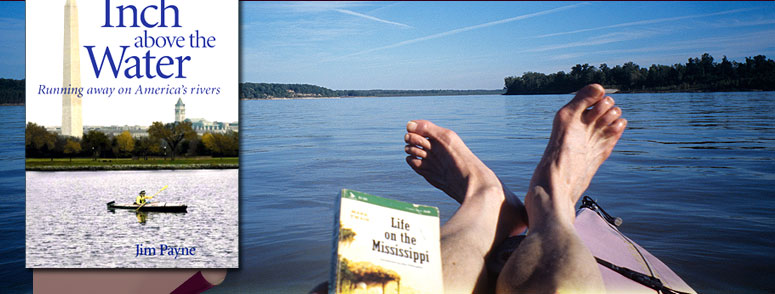Voyage on the Connecticut (page 4)
Though I was camping on private property, I saw no one. As it grew dark, I heard a "kerplunk" that sounded exactly like a ten-pound stone being dropped into the water, suggesting the presence of some strong, dextrous creature, and I wondered about it for a while. (On a later evening, I watched a fish jump and make exactly that kerplunk sound). Besides that, the only noises of the forest were falling hickory nuts clattering through the branches and the occasional huff of a deer.
The highlight of the next day was chasing fleeing ducks—not on purpose, but because they didn’t have the sense to avoid me. The broods of mergansers that had been raised along the river all summer were almost fully mature, with the youngsters as big as the adults, and with the same attractive rust and white coloring. Mature ducks know that the only way to escape an oncoming boat on the river is to flee to the side and let the boat pass. This was the principle I saw the merganser moms trying to impart to their offspring—the ones still willing to follow her—as I came by. But many of the youngsters were getting too big for their britches. They wanted to think for themselves, and what their own little brains told them to do was flee, flee, flee.
Eventually I had a group of some 20 ducks ahead of me. Each time I drew near, they fled further down the river, half flying, half running across the top of the water until they were exhausted and stopped to rest. Then I would catch up, seeming a diabolical Dr. Doom pursuing them unto eternity, and they would spurt another few hundred yards. I took satisfaction in the fact that I was giving these ducks a good workout, strengthening their muscles for upcoming challenges—like flying to South Carolina for migration. The chase went on for hours until, in the early afternoon, we came to a wide stretch and the ducks crowded to the far side, and then headed up river behind me, learning the lesson that all ducks eventually learn about not trying to outrun a boat.
On the third day, I approached Wyoming Dam at Northumberland, New Hampshire – another breeched barrier I really didn’t want to go through. Watching the water ahead carefully, I saw where it started to speed up and I pulled ashore by an empty folding chair positioned on the bank. Though the banks of the Connecticut are natural and unspoiled, in most places civilization lies only a few steps beyond the trees that fringe the river. I found a dirt path, followed it, and came upon a house, being painted by its owner, Dick Cook, a retired paper mill worker. I asked if I could bring my kayak ashore and make a portage. Dick not only agreed but offered to drive my kayak and me to nearby Lancaster where there was a motel and restaurants. I didn’t need much urging to accept his offer.
Back to First Page • Next Page >

